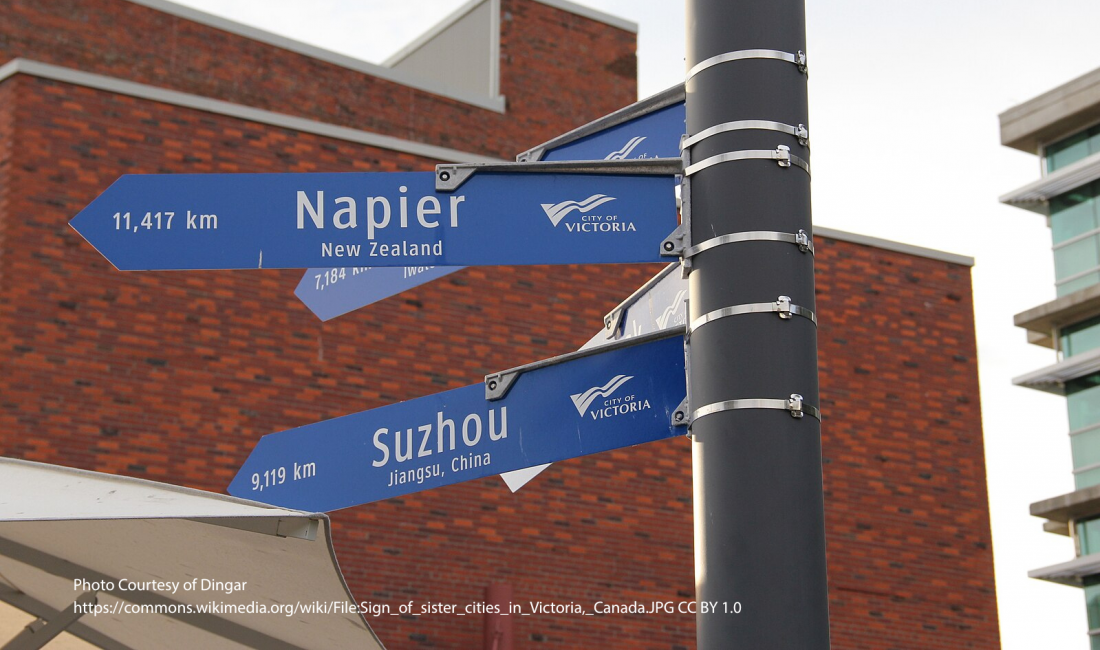What's worth reading, watching and attending as May turns to June.
Welcome to the monthly newsletter from Democracy Local, a planetary publication of stories, ideas, data, scholarship, and events about everyday people governing themselves.
More about us here.
Donations to the International Democracy Community, which hosts our publication, can be made here.
Please feel free to sign up here or subscribe to our Substack.
FOLLOW DEMOCRACY LOCAL ON SOCIAL MEDIA
Facebook: https://www.facebook.com/democracy.local
BlueSky: @democracylocal.bsky.social
Twitter (X): @democracylokal
Mastodon: https://mastodon.social/@DemocracyLocal
THE PLANETARY POWER OF YOUR TWIN CITY
Writing in Noema, Joe Mathews discusses the power of city twinnings—usually seen as casual, cultural relationships between “sister cities”—to support and rebuild communities in a world where conflict and disaster are all too common. Here is a short excerpt:
“As local communities, especially across Europe, watched the war against Ukraine and the destruction of its local communities, many rallied to help their Ukrainian partners. One very popular method has been for cities to “twin” with a Ukrainian counterpart. In normal times, “twinnings,” or sister-city partners, are considered friendly cultural or trade agreements that might produce a joint festival or one-off project.
“But in moments of crisis, they can become life-saving bilateral partnerships. And fittingly, their history is rooted in depression and war.
“The first great twinning launched between Toledo, Ohio, and Toledo, Spain, in the 1930s, spawned a network of support between a Midwest industrial city suffering from the Depression and an Iberian river city suffering from civil war. The idea of twinning became even more popular in World War II when Coventry, a West Midlands city bombed during the Blitz, established a partnership with besieged Stalingrad (now Volgograd) in 1942. During that twinning, Coventry women collected six pence from each local resident to send to their Soviet counterparts. (The Coventry-Volgograd twinning relationship endured until 2022, when the British city suspended it after Russia attacked Ukraine.)
“Twinnings had a revival during the Balkan wars. The most famous such twinning came in the early 1990s when Barcelona declared Sarajevo its 11th district and allocated resources to the besieged Bosnian capital.
“For the three years of siege, Barcelona’s support came in the form of food and medicine. When the siege lifted, Barcelona sent planners and funds to reconstruct two neighborhoods of Sarajevo. The partnership endures to this day, with Sarajevo and Barcelona exchanging people and support under the auspices of the District 11 City to City Association.
“The Association of Local Democracy Agencies, which was first organized by local-level activists to establish twinnings during and after the Balkan wars, has been doing similar work in Ukraine. European institutions and the OECD have encouraged such partnerships.
“And so, in Ukraine, twinnings are everywhere. Kyiv alone has bilateral twinnings with Warsaw, Paris, Rome, Lyon, Oslo, Edinburgh, Hamburg and Mexico City. Lviv is twinned with Tartu and Winnipeg, Odesa with Marseille, Mykolaiv with Glasgow.
“Many of these relationships are limited expressions of solidarity, but some cities have sent money and people to build structures and plan deeper reconstruction. Hamburg, which is both city and state, is assisting Kyiv with reconstruction. The Polish cities of Opole and Radom have sent multiple cargoes of humanitarian aid to Vinnytsia, in south-central Ukraine. The small city of Lozova, despite being on the frontlines of the Kharkiv oblast, has been working on economic plans and joint projects under a twinning with Edward River Council in New South Wales, Australia.”
DEMOCRACY INTERNATIONAL EDITORIALS
Who or what is the leader of the free world now? Democracy International’s Daniela Vancic, an American, writes that it’s Europe. And that conclusion is part of an epic comeback story.
This is not science fiction. Democracy International’s Caroline Vernaillen on how the impacts of democracy funding cuts are all too real.
ASIA DEMOCRACY CHRONICLES
Our partner in Asia keeps producing great, original journalism about democracy at all levels, especially the local. One highlight from this month: an essay from the Jalaur River about the struggles of local indigenous communities in the Philippines to have their rights and autonomy respected
READINGS
Understanding Referendums, a new book from Matt Qvortrup, professor at the Centre for European Studies, Australian National University, and adjunct professor of political science, LUISS Guido Carli University of Rome, Italy.
At The Future of Where, Bill Fulton writes, from a Minneapolis example, about turning the dead shopping mall into a thriving urban hotel—and reclaiming an old Vienna idea of public space.
Had enough with defensive talk about saving democracy? Matt Leighninger of the National Civic League details a very specific set of strategies for how to go on offense in making your community, and your world, more democratic.
Pop Defiance: Santa Cruz, California, defies state-law by imposing its own local tax, approved by its voters, on soft drinks.
Jonathan Moskovic sees citizens assemblies in Israel as ray of hope
Will major cities continue to shape global economic governance? Smart piece from Carnegie back in December.
Claudia Chwalisz of Democracy Next flags a new paper that answers the question: “Have citizens' assemblies been commissioned more by the left or the right?” Rodrigo Ramis-Moyano, Graham Smith, Ernesto Ganuza, and Thamy Pogrebinschi, writing in the Journal of Deliberative Democracy find that assemblies don’t swing one way or another politically speaking. Notes Claudia: “This doesn't surprise me. Citizens' assemblies go beyond traditional left-right, partisan politics. Elected officials across political parties have seen the benefit of these democratic institutions for bringing people together across divides to solve collective problems.”
EVENTS
May 20, 10:30 am (Central European Time) Cities Learn: Data Feminism. Hosted by the City of Bologna. With Giulia Sudano, president and Co-Founder of Period Think Tank, an association promoting gender equity through a feminist approach to data. The latest seminar from the European Capital of Democracy.
May 21-23. Córdoba, Argentina. 24th Conference of the International Observatory of Participatory Democracy.
JUNE 7. 1-4pm (Pacific time), Los Angeles. Model Civic Assembly. Hosted by Public Democracy LA and Braver Angels. Registration here. In-person at Veteran's Memorial Building, Iskan Room. 4117 Overland Avenue, Culver City, California.
JUNE 10: Seoul. All-day Opening of the Museum of Korean Democracy. In-person. At the historical site of the Namyoungdong Daegongbunshil (Namyoung Police Espionage Interrogation Office), a building that served as a police detention and torture facility during Korea’s dictatorship period from the 1970s to the early 1990s. (hat tip to Lee Jae-oh, President, Korea Democracy Foundation)
SEPTEMBER 17, Vienna City Hall. The Innovation in Politics Awards. Pre-registration and more information here.
GREAT REFERENCES
Democracy R&D debuts its first annual report, full of major trends and small examples of citizens assemblies and other deliberative processes.
Democracy 2076, which is plotting the future of U.S. democracy, says it “has worked with Harmony Labs to develop a body of research to understand how depictions of democracy and the future in entertainment media might be shaping people’s understanding of government. Today, we are excited to share with you the conclusion of the first phase of this research, which examines the media consumption of 130,000 streaming platform users watching nearly 29,000 individual programs to understand the prevalence of government-themed media and how different themes around democracy and authoritarianism impacted different values-based audiences.” The report is here.
Via its new Airtable database, People Powered does all the reading of studies you have no time for, and finds 19 fascinating new lessons of participatory budgeting practice around the world.
Also from People Powered, looking at participatory climate action initiatives in communities in Brazil, Nigeria, and Canada.
SING A SONG, TAKE A SAUNA
Do songs and saunas bind a local community? Democracy Local correspondent Bruno Kaufmann visits the small town of Vörâ, in a Swedish-speaking region of Finland, to meet the musical sensation group KAJ, which has just taken a song about saunas to the Eurovision Song Contest in Basel, Switzerland.
You can catch KAJ performing the song here:
Also in our Letters feature, Dane Waters writes from Ho Chi Minh City about the deeper meaning of billboards there.
CALIFORNIA COLUMNS
The next winner of the All-America City award, the biggest prize in U.S. local governance, might not be a city at all. It’s a collaboration, or council of governments, called Western Riverside. Joe Mathews visits.
An Obituary for the American Republic. And a call to replace it with something more democratic.
REMEMBRANCE
Pepe Mujica, the local activist and imprisoned revolutionary who became Uruguay’s president, died. The filmmaker Kelly Candaele offered this remembrance of his afternoon with the famously modest Mujica for Democracy Local. It included this video on what Mujica saw as the fundamentally democratic art of working with one’s own hands.
TECH AHEAD: WHAT IS THE WAVES?
At a London event, various partners, including Demos and New Local, a think tank and network of forward-thinking local councils, announced a new trial project called “Waves.” It’s an AI technology that “aims to bring people together to tackle contentious local issues and strengthen trust in local government.” It’s supposed to be significantly faster and cheaper in convening.
The trial is scheduled to begin in the Camden Council, before moving to a second council in early 2026. There’s also a Waves Learning Network with an event on July 8. The digital democracy platforms, PSi and Remesh, are involved.
WORTH WATCHING
Carnegie Endowment's online event, with Democracy Local's Joe Mathews, on "Deliberative Democracy in a Digital Era."
Bogota's guide to building a caring city.
DEMOCRACY TYPE OF THE MONTH
“Militant democracy” is getting a workout as democracies around the world protect against anti-democratic forces using elections to win power. Including in this paper.
Militant democracy refers to measures of constitutional entrenchment, such as bans on anti-democratic or fascist parties, that attempt to defend democracy. The U.S. Constitution’s 14th Amendment prohibition on insurrectionists running for president—a prohibition that was ignored by the U.S. Supreme Court last year, allowing Donald Trump to return to power—is another example of “militant democracy.”
Military democracy, however, has a central paradox: measures to defend democracy by excluding anti-democratic forces can themselves appear undemocratic. But such militancy can work, as we saw over the weekend in Romania, where intervention by Romanian courts blocked a leading right-wing candidate from the ballot, opening an opportunity for a pro-democracy moderate candidate to win the presidency in a runoff.
DEMOCRACY QUOTE OF THE MONTH
“A lot of people like a lot of money. They should not go into politics.”
—Jose Mujica, former president of Uruguay, 1935-2025
SUGGESTED LINKS TO LOCAL DEMOCRACY RESOURCES AND PARTNERS
International Democracy Community
Federation for Innovation in Demcoracy-Europe and FIDE North America
United Cities and Local Governments
International Observatory of Participatory Democracy
ASU Participatory Governance Initiative
Taiwan Foundation for Democracy
National Civic League’s Center for Democracy Innovation
Journal of Deliberative Democracy
Local Government Information Unit
The Future of Where
Global Citizens’ Assembly Network (GloCAN),
newDemocracy Foundation (Australia)
National Coalition for Dialogue & Deliberation
University of Canberra (Australia)
Global Democracy Coalition newsletter




